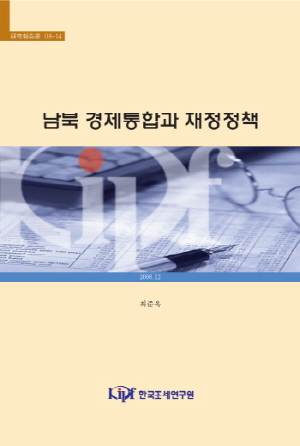Fiscal Impacts of Rapid Integration of two Koreas
- Keyword
- 남북통일, 소득격차, 지속가능성, 남북통일, 소득격차, 지속가능성
- Title
- Fiscal Impacts of Rapid Integration of two Koreas
남북 경제통합과 재정정책(Ⅰ): 재정의 지속가능성에 영향을 미치는 요인 분석
- Authors
- Joonook Choi; 최준욱; Joonook Choi
- Issue Date
- 2008-12-01
2008-12-01
- Publisher
- KIPF
KIPF
- Page
- pp. 146
pp. 146
- Abstract
- This report studies the fiscal impact of economic integration of two Koreas. There are several previous studies dealing with the fiscal issues regarding unification, but they share some common problems. This study tried to overcome the shortcomings of previous studies in two aspects. Instead of estimating unification costs for a relatively short period of time, this study examines how much fiscal policy should be adjusted to maintain fiscal sustainability in the long run. Furthermore, this study carries out a variety of sensitivity analysis, to accommodate big uncertainty in the economic variables and policies in the course of integration.
The type of integration analysed in this study is rapid, in that no artificial restrictions are imposed on labor mobility. However, it is less rapid than in Germany, in that we do not assume rapid integration of social systems. The fiscal outcome under such scenario is not very pessimistic. Fiscal sustainability can be maintained only with a moderate increase in taxes, if the productivity in the North Korean region rises to 80-90% of that in South Korean region in the next 50-60 years after the integration.
본 연구에서는 남북한 경제가 비교적 급진적으로 통합되는 경우를 가정하고, 그러한 변화가 중장기적으로 재정상황에 어떤 영향을 미치는지, 그리고 그러한 상황에서 재정의 지속가능성에 영향을 미치는 요인들은 무엇인지에 대해 분석한다. 남북한 경제의 급진적 통합의 영향과 관련하여서는 1990년대부터 통일비용 맥락에서 이루어진 일련의 연구들이 있다. 그러나 그러한 연구들은 주로 일정한 가정하에서의 재정지출 소요를 추정하는 것에 중점을 두고 있어, 재정의 지속가능성에 영향을 미치는 다양한 요인의 영향에 대해서는 충분히 분석하지 못하고 있다.
본 연구에서 가정하는 경우는 남북한 경제가 통합되는 과정에서 인구이동을 인위적으로 통제하지 않는다는 점에서 비교적 급진적이라 할 수 있다. 그러나 사회제도까지 완전히 급진적으로 통합하거나, 소득균등화, 공공서비스 수준의 균등화 등은 어렵다는 점을 지적하며, 통합의 급진성에 대해 일정한 한계를 감안한다.
일정한 조건이 만족되는 경우에는 재정의 지속가능성에 문제가 없을 뿐 아니라, 장기적으로 국가부채비율도 비교적 낮은 수준으로 하락하는 것으로 나타나고 있다. 그러나 다양한 요인이 국가부채비율이나 재정의 지속가능성에 영향을 미칠 수 있다. 이자율이 높아지거나 성장률이 하락하는 경우에는 국가부채비율은 상승한다.
재정의 지속가능성 유지와 관련하여 가장 중요한 것 중 하나는 장기적으로 남북 소득격차가 축소될 수 있는가 하는 점이다. 북한지역의 소득증가율이 낮아 장기적으로도 남북한 격차가 크게 유지되는 경우에는, 재정의 지속가능성 확보를 위해서는 재정수입 확대 폭을 상향조정하는 등의 정책대응이 필요하다. 통합 직후에 북한지역에서의 필수적인 지출을 감당하는 것에는 크게 무리가 없을 것으로 보인다. 그러나 남북한 소득균등화, 남북한 사회제도의 통합 등을 무리하게 추진하는 경우에는 재정의 지속가능성이 확보되기 어렵다. 재정의 지속가능성 확보와 관련하여 단지 재정지출만이 아니라 재정수입과 관련된 부분도 매우 중요하다.
- Keywords
- 남북통일, 소득격차, 지속가능성, 남북통일, 소득격차, 지속가능성
